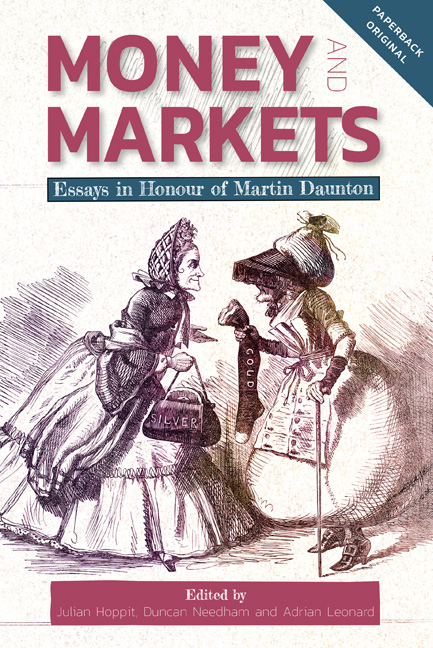Book contents
- Frontmatter
- Contents
- List of Figures
- List of Tables
- List of Contributors
- List of Abbreviations
- Introduction
- 1 Taxing London and the British Fiscal State, 1660–1815
- 2 Rents, Squalor, and the Land Question: Progress and Poverty
- 3 Marine Insurers, the City of London, and Financing the Napoleonic Wars
- 4 The Political Economy of Sir Robert Peel
- 5 Champagne Capitalism: France’s Adaptation to Britain’s Global Hegemony, 1830–80
- 6 The 1848 Revolution in Prussia: a Financial Interpretation
- 7 Imperial Germany, Great Britain and the Political Economy of the Gold Standard, 1867–1914
- 8 Knowledge, Contestation and Authority in the Eurodollar Market, 1959–64
- 9 Continuity and Change in British Conservative Taxation Policy, c. 1964–88
- 10 Britain Since the 1970s: a Transition to Neo-Liberalism?
- 11 Maplin: the Treasury and London’s Third Airport in the 1970s
- 12 Workfare and the Reinvention of the Social in America and Britain, c. 1965 to 1985
- 13 Charity and International Humanitarianism in Post-War Britain
- 14 Discounting Time
- 15 The Material Politics of Energy Disruption: Managing Shortages Amidst Rising Expectations, Britain 1930s–60s
- The Published Writings of Martin J. Daunton
- Index
- People, Markets, Goods: Economies and Societies in History ISSN: 2051-7467
15 - The Material Politics of Energy Disruption: Managing Shortages Amidst Rising Expectations, Britain 1930s–60s
Published online by Cambridge University Press: 13 April 2021
- Frontmatter
- Contents
- List of Figures
- List of Tables
- List of Contributors
- List of Abbreviations
- Introduction
- 1 Taxing London and the British Fiscal State, 1660–1815
- 2 Rents, Squalor, and the Land Question: Progress and Poverty
- 3 Marine Insurers, the City of London, and Financing the Napoleonic Wars
- 4 The Political Economy of Sir Robert Peel
- 5 Champagne Capitalism: France’s Adaptation to Britain’s Global Hegemony, 1830–80
- 6 The 1848 Revolution in Prussia: a Financial Interpretation
- 7 Imperial Germany, Great Britain and the Political Economy of the Gold Standard, 1867–1914
- 8 Knowledge, Contestation and Authority in the Eurodollar Market, 1959–64
- 9 Continuity and Change in British Conservative Taxation Policy, c. 1964–88
- 10 Britain Since the 1970s: a Transition to Neo-Liberalism?
- 11 Maplin: the Treasury and London’s Third Airport in the 1970s
- 12 Workfare and the Reinvention of the Social in America and Britain, c. 1965 to 1985
- 13 Charity and International Humanitarianism in Post-War Britain
- 14 Discounting Time
- 15 The Material Politics of Energy Disruption: Managing Shortages Amidst Rising Expectations, Britain 1930s–60s
- The Published Writings of Martin J. Daunton
- Index
- People, Markets, Goods: Economies and Societies in History ISSN: 2051-7467
Summary
On 25 December 1962, thousands of people, from Lancaster to mid-Wales, celebrated Christmas by candlelight. The electricity supply had collapsed. In the St Margaret's Road area of Prestwich, the power went out at lunchtime and was reinstated only at 4:30 a.m. Elsewhere the power outages ranged from three to 23 hours. In the early 1960s, Christmas Day often saw a great surge in demand for electricity. Even though industrial use was less, residential demand for cooking Christmas dinner and heating put tremendous pressure on the National Grid. A major cause of supply failure, according to Philip Chantler, under-secretary of the Electricity Division of the Ministry of Power at the time, was the steady increase in the number of appliances in households, which was pushing up electricity demand by around 10 per cent annually. For most of the year, appliances were rarely switched on simultaneously. It was this diversity of use, Chantler noted, that enabled the grid to supply all customers. Once a cold spell coincided with a national holiday, however, a ‘collapse of diversity’ followed, inevitably leading to a disruption of supply.
As Martin Daunton has shown for the gas industry in Victorian Britain, public utilities operated within material politics that involved the state, business, and consumers. Energy disruptions provide an interesting extension of this work because they make visible the core values and interests underpinning the material politics of a particular era that are often hidden or taken for granted. If there is not enough energy to satisfy everyone, who should be supplied first and whose needs should be curtailed? What are the basic needs to be protected, and which can be sacrificed? In short, disruptions illuminate the very fabric of ‘normality’. Energy disruptions are politically and morally charged moments during which different groups of users mobilise a language of equity, fairness, and justice. This chapter follows disruptions and the career of this moral language from the interwar years through the Second World War and into the ‘affluent’ 1960s. The development of the modern energy system in industrialised nations is often described as a constant expansion of supply with a corresponding growth in demand. With regard to residential energy in particular, the spectacular rise of electricity consumption over the last century is largely attributed to the success of utility providers and appliance manufacturers in cultivating demand.
- Type
- Chapter
- Information
- Money and MarketsEssays in Honour of Martin Daunton, pp. 263 - 280Publisher: Boydell & BrewerPrint publication year: 2019



